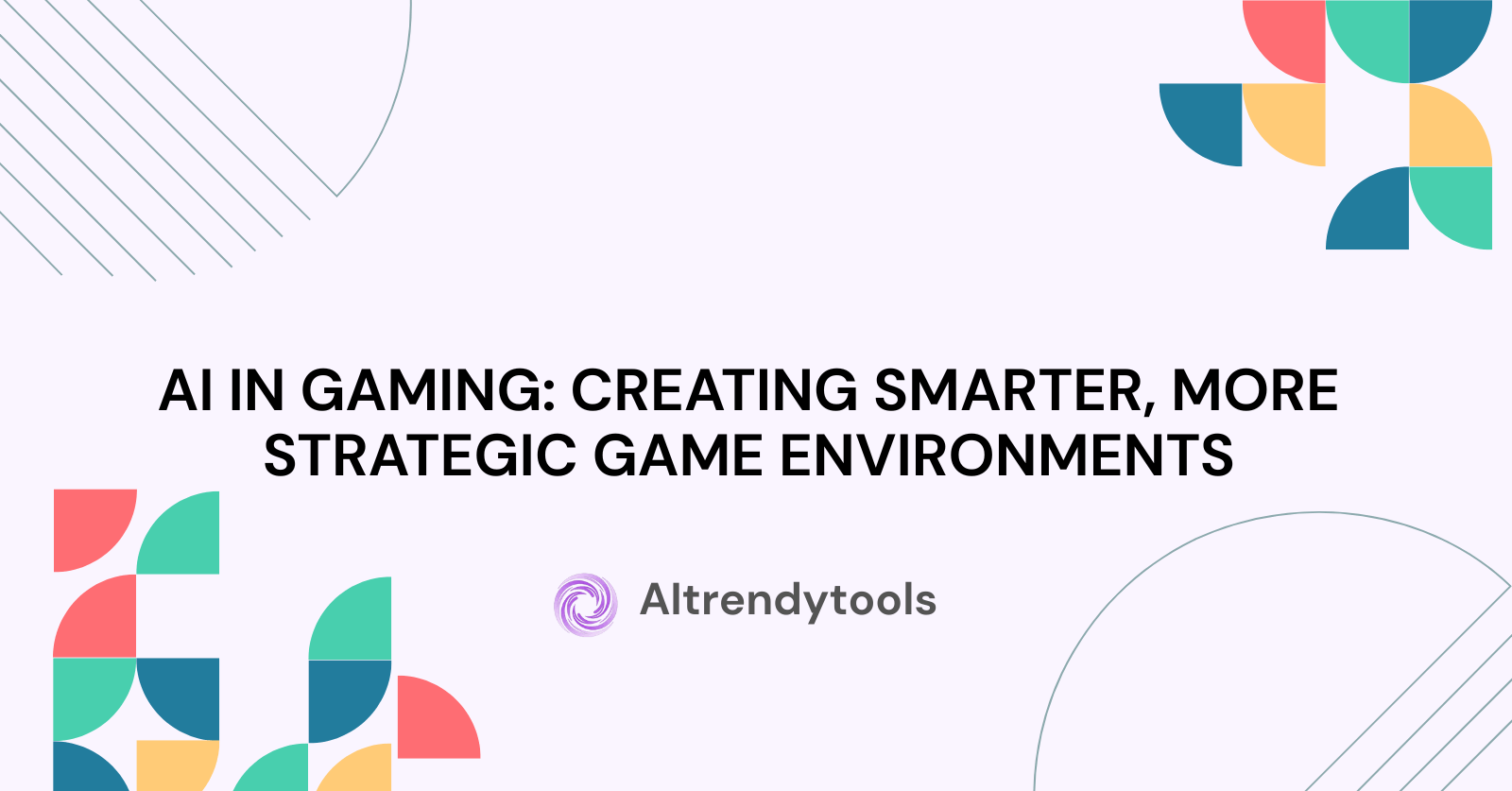🔥 AITrendytools: The Fastest-Growing AI Platform |
Write for usAI in Gaming: Creating Smarter, More Strategic Game Environments
Explore how AI is revolutionizing gaming with smarter NPCs, dynamic storytelling, and adaptive gameplay for a more strategic, personalized experience.
Sep 1, 2025
The games business has always relied on the cutting edge of technological advancements. From 8-bit imagery to photorealism and from minimalist arcade gameplay to huge open-world quests, gaming has moved incredibly quickly through the decades. But no tech advance has been quite as revolutionary or compelling as the advent of Artificial Intelligence (AI) in game-making.
Today, AI isn't just a behind-the-scenes tool for game developers. It’s shaping the player experience itself — creating smarter NPCs (non-playable characters), dynamic storylines, strategic opponents, and adaptive gameplay that learns and evolves. Whether you’re navigating alien planets, surviving zombie apocalypses, or testing your skills in online poker, AI is what makes those worlds more intelligent, immersive, and increasingly unpredictable.
So, just how is AI changing the gaming world? Let's take a look at how this sophisticated technology is creating more intelligent, more strategic game worlds and what that bodes for the future of play.
Smarter NPCs: Moving Beyond Scripted Behavior
In the old days, NPCs were usually stuck in static roles and repetitive actions. They'd stick to predetermined scripts — attack when attacked, flee when outnumbered, or repeat the same lines ad infinitum.
AI has totally changed this paradigm.
With the application of neural networks and machine learning, modern NPCs can now adjust according to the behavior of players, react in subtle manners, and even learn from previous experiences. This gives players the feeling of having more realistic encounters and fewer machine-like reactions. For example, an AI enemy in a stealth game might shift patrol patterns or work together with other enemies to flank a player who has been employing the same strategy over and over.
This move towards dynamic responsiveness not only heightens the difficulty but also continues to keep the players interested since the game never gets old whenever they play it.
Procedural Storytelling: AI as Narrative Architect
Procedural storytelling is another pioneering use of AI in games. Titles such as AI Dungeon and Crusader Kings III utilize AI to create branching narratives, relationships between characters, and plot events that grow organically in real-time as the player makes their selections.
Whereas in classic storytelling, developers write out every possibility, AI facilitates emergent stories — narratives that develop naturally out of gameplay and not beforehand. This approach is also gaining traction in igaming software development, where personalized gameplay experiences are becoming a major differentiator.
The technology is a gateway to limitless replayability and allows every player's experience to be distinct — a nirvana for both large studios and independent developers.
Real-Time Strategy and Tactical Depth
AI's contribution to strategy games — both turn-based and real-time (RTS) — is particularly important. In the past, strategic AI in games tended to use cheating mechanisms to mimic difficulty (e.g., infinite resources or viewing beyond the fog of war). Nowadays, AI opponents are learning to play more intelligently.
With the use of deep learning and reinforcement learning, developers are building AI agents that:
- Learn the best strategies with experience
- Adjust to various player styles
- Employ trickery or bluffing strategies
- Assess risk versus reward in real-time
Consider AlphaStar, DeepMind's StarCraft II-playing AI that achieved grandmaster status by learning through millions of games. It didn't memorize strategy — it created new ones. This type of advanced AI implementation is now fueling new gameplay where players have to constantly optimize their strategies, not merely memorize winning moves.
Personalized Gameplay: A Single Game, Endless Experiences
Maybe the most impactful application of AI is in tailoring the player experience.
No more one-size-fits-all games. AI can monitor how you play — how hard you play, what worlds you like, how often you explore or charge through objectives — and adapt the game world to suit your playstyle.
This can involve:
- Dynamically adapting difficulty
- Providing missions that suit your tastes
- Varying in-game dialogue or decision-making based on previous behavior
Mobile games specifically are using this to maximize retention and engagement. This adaptive style is also making its way into digital card games, where you can now Play Free Blackjack Card Game Online with AI-driven opponents that adjust to your strategies for a more thrilling experience.
AI as Game Designer: Procedural Content Generation
In addition to behaviors and storytelling, AI is also taking on the role of game designers, designing levels, environments, and even music automatically.
Procedural content generation (PCG) driven by AI is utilized to create:
- Massive open-world landscapes (such as in No Man's Sky)
- Puzzle layouts that become more complex based on your ability
- Game assets and textures customized in real-time
This not only reduces development time and cost but also enhances replay value by offering near-infinite variations of levels or challenges. As AI tools like GPT-based design assistants and generative adversarial networks (GANs) evolve, we’re likely to see AI-generated games that rival human-created ones in creativity and cohesion.
Ethical AI and Fairness in Competitive Games
As AI becomes intelligent, fairness in play is a top concern, particularly in competitive and multiplayer settings. There's a delicate balance between a competitive AI opponent and one that seems to be convincingly overpowered.
Developers increasingly employ AI to mimic cheating activity during testing in order to catch loopholes, bugs, and possible exploits. Anti-cheat systems based on machine learning can also identify suspicious patterns of behavior, such as automated aimbots or unnatural movement, far more quickly than manual moderators.
Online communities benefit by preserving integrity and trust, particularly in games with real-world money or rankings on the line.
AI Companions and Emotional Engagement
AI in video games isn't just about smarter foes — it's also about smart friends.
Today's games are adding emotionally intelligent AI characters that not only help in combat but respond to your decisions, provide advice, or build relationships. From Ellie in The Last of Us to Atreus in God of War, these characters come alive due to sophisticated AI systems that handle emotional reactions, relationship development, and even memory.
As developers seek to create even more personalized and emotionally resonant characters, tools like an AI character generator are becoming indispensable. These platforms use advanced algorithms to help designers rapidly prototype and iterate compelling NPCs, complete with backstories, personalities, and unique visual styles. Whether you're building a loyal sidekick or a cunning antagonist, AI-generated characters can dramatically cut down development time while enhancing narrative depth.
It is not uncommon to find some developers trying out AI voice synthesis in order to provide NPCs with dynamic dialog, whereby the characters are able to have semi-original conversations with the player, rather than recycle pre-stored lines.
Since AI is increasingly fusing with natural language processing (NLP), anticipate a time when your in-game companion not only battles alongside you but can interpret and react to your emotions.
Multiplayer and AI: Cooperative and Competitive Dynamics
Even in multiplayer settings, AI is important. Fortnite, Apex Legends, and Call of Duty: Warzone all employ AI-driven bots to populate vacant lobbies or serve as training grounds for newbies.
But that's not all. AI is also employed for:
- Matchmaking algorithms that take into account skill level, latency, and historical performance
- Dynamic event generation in live-service games
- AI co-players that learn as you play (particularly beneficial for single players in team games)
This helps the overall experience be more cohesive and accessible, accommodating both veteran players and new ones alike without compromising on game quality. For game developers delivering live or on-demand content, exploring a Vimeo OTT alternative can provide more flexibility and monetization options.
The Future: AI-Powered Creativity and Thinking Game Worlds
In the future, the possibilities of AI in games appear endless.
We’re moving toward game environments that evolve independently, characters that write their own stories, and worlds that respond holistically to player actions. Think about a future RPG where your decision to burn down a village actually causes an entire political faction to rise up against you, not because it was scripted, but because the AI ecosystem organically responded.
Game development studios such as Ubisoft and EA are already testing AI-driven virtual game masters that act as interactive narrators and world-scapers. Alongside developments in cloud gaming and AI-driven content streaming, we may soon be on the verge of an era of fully adaptive, smart games that present a different experience to each player each time. These advancements will also redefine hosting a game server, as dynamic content and real-time AI interactions demand more flexible and scalable server infrastructures.
Final Words
AI is no longer an ancillary technology for gaming — it's the driving engine for the next innovation. With the ability to design smarter, more strategic, and more emotionally intelligent worlds, AI is revolutionizing the way we play, what we demand from games, and the types of stories we can tell.
Whether it's a strategic bluff in online poker, an NPC who discovers your strategy, or a procedurally generated world designed specifically for you, AI makes sure that the future of gaming is not just smarter, but more personalized, more difficult, and more boundless.
🚀 Submit Your Tool to Our Comprehensive AI Tools Directory
Get your AI tool featured on our complete directory at AITrendytools and reach thousands of potential users. Select the plan that best fits your needs.





Join 30,000+ Co-Founders
Related Blogs
8 Best AI Logo Generators in 2026
Discover the 8 best AI logo generators in 2026 after testing 30+ tools. See why Design.com ranks #1, followed by BrandCrowd, plus detailed reviews, comparisons, and results.
Design.com: Best AI Design Tool in 2026
Is Design.com the best AI design tool in 2026? We tested its AI logo generator, website builder, business cards, brand kit, and more—read our full in-depth review.
How AI May Change the Future of Online Casinos
Discover how AI is transforming online casinos with personalized gameplay, enhanced security, smarter marketing, and improved player protection.
Submit Your Tool to Our Comprehensive AI Tools Directory
List your AI tool on AItrendytools and reach a growing audience of AI users and founders. Boost visibility and showcase your innovation in a curated directory of 30,000+ AI apps.





Join 30,000+ Co-Founders

